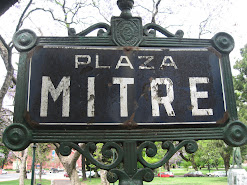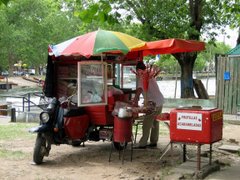I doubt President Kirchner has ever won a game of chess. That would require him to see one or two moves ahead. Didn't he know that price controls in the energy sector would lead directly to shortages by fuelling rampant demand and discouraging investment that might have helped increase supply? Couldn't he see that the overheated economic activity in other sectors would spark inflation and thereby sabotage his original simplistic goal, which was low prices for voters? So by forcing down energy prices, he made all the other ones go up. What's really scary is that Cristina Kirchner is known to have much less interest in economics than her husband.
Exxon/Mobil, the world's largest oil company has been doing business in Argentina for over 100 years, but the company is now trying to sell it's assets and exit the country. The simple reason is that the Kirchner government has made it impossible for it to do business here. And after 2 1/2 years of clashes with the government took a turn for the worse last week, Royal Dutch/Shell must be thinking hard about its future here as well.
In the wake of the recent winter energy crisis, Shell was hit with hefty fines and a lawsuit against it's boss for allegedly undersupplying the market. Then last week the government arbitrarily ordered the closing of Shell's Dock Sud oil refinery on trumped up charges of excessive pollution and misuse of water. The refinery has an environmental management system that is ISO 14001 compliant and uses "black" water from the highly polluted Riachuelo river for refrigeration before returning it to the River Plate in a much cleaner condition, a spokesman said. In ordering the closing, inspectors also sited "stains and spills" and improper storage of waste rags.
Why would Kirchner want to shut down an oil refinery in the middle of a touch-and-go energy situation? Is he small-minded enough to carry on a petty school yard grudge without any regard for the consequences? Is Shell simply his scapegoat for the crisis, not to mention a convenient new villain for electioneering? Is Hugo Chavez Nestor's master?
When the first wave of an energy crisis hit this winter the government found itself unable to meet nearly half of all demand for gas on peak days. The first thing the President did was blame the weather. But everyone else in the schoolyard knows that cold days come in winter just as hot ones come in summer. Anyway, Kirchner soon remembered that a big bad corporation makes a better scapegoat than mother nature, and so turned his attention back to a favorite enemy, the Royal Dutch/Shell corporation and it's chief Juan Jose Aranguren.
Thanks to price controls, a megawatt hour of electricity in Argentina sells for $25 compared to $73 in Chile. Consumers continue to pay very little for gas even though the government was forced to increase spending on expensive imports and subsidies. Blackouts this winter did not hit voting customers directly. Factories were forced to shut down from 4pm to 10pm on critical days. Consumers will be protected through the election, but will scream bloody murder if and when prices increase at the pumps and blackouts hit home next year.
More than half of the country's electricity comes from gas and oil fired generators. While more reliable than hydro, wind, or solar. a lack of investment in exploration has left the country with declining gas reserves. A reporter for the Financial Times claims the country has a 7 years supply in proven reserves, but that number sounds highly exaggerated.
The nation is currently building two new gas-powered generators that are scheduled to go on line next year. Argentina also has a hydroelectric project with Paraguay that will be expanded if that country agrees to flood more of its territory (40% of this country's electrical supply comes from hydro). Argentina also has two nuclear power plants, Atucha and Embalse, and construction on a third, which was stopped in 1994, was recently restarted. (Nuclear accounts for the remaining 4% of supply).
One major industry that depends on an efficient energy system is agriculture. But shortages of gasoil, which is used to run machinery, are starting to hit that sector just in time for winter weat harvest. Gas shortages are also threatening the future supply of fertilizers.
So why is Kirchner outwardly hostile to companies like Shell, a major player in the highly competitive energy sector? Foreign investment is essential if Argentina is going to build an efficient system which in necessary to attract investment in other areas of the economy. And without that there will be no GDP growth and therefore jobs, income, health care and education will not improve. Maybe there is one regional foreign power with big plans here. What promises were made to Hugo Chavez in exchange for economic support?
Do Argentines believe that their children will be better off in the future then they themselves are now? The country has waited a long time for a return to prosperity. But Christina Kirchner is not expected to make major changes in economic policy. If elections in October go the way the Kirchners think they will, the wait will go on indefinitely.
Solutions are out there. Someday Argentina will turn to the agriculture sector and the country's vast land resources for one answer to the big energy question: biofuels. But development is in its infancy.
The good news is that high-growth countries like China and India and high-income ones like the United States are in desperate need of resources. When Argentina does finally get serious and build sustainable infrastructure in all areas of society, it right the world will come knocking at its door.
A blog which may appeal to those who enjoy stories about people, politics, economics, sports, and travel. In and around Argentina and the USA.
9/08/2007
Subscribe to:
Post Comments (Atom)



























































































No comments:
Post a Comment